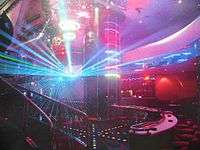The Palladium Niteclub
 The Palladium Nightclub mid 1980s | |
| Opened | 1986 |
|---|---|
| Closed | 2000 |
The Palladium Niteclub was a nightclub in the city of Christchurch, New Zealand, which shared the same name as the famous Palladium in New York City. It opened in 1986 as part of the MacKenzie group. The Palladium was the first night club in Christchurch city to include a full laser lightshow. It was also the largest nightclub in Christchurch with a capacity of about 800 people (this capacity was increased in 1996 after some renovation work). As the largest club in Christchurch, the Palladium was frequented by several international acts. During their 1986 tour of New Zealand, Simple Minds spent the evening there after their show at the Christchurch Town Hall.[1] Pseudo Echo also visited The Palladium after their Town Hall concert.
The Palladium was extremely popular when it opened in October 1986 with large queues regularly forming along Gloucester Street. The entry fee was $10 per person on Friday nights and $15 on Saturday nights. This was considered expensive in the 1980s. People were amazed by the imported laser and lighting show, and by the plush neon lit interior of the club. When it opened, The Palladium was considered New Zealand's most modern and lavish nightclub.
History
The Palladium's sound system was purpose built through consultation with local band promoter Mel Blokhuis of Ex-Ray Staging, and was run with no major modifications through the life of the club.[2] Unlike other clubs in Christchurch, the Palladium was open 7 nights per week and it was the first club to gain a 24-hour liquor license, although the club only operated from 9pm – 7am.
Shane Darren and Dwight Caldwell were the Palladium's first resident DJs. Their residencies ran from 1986 to 1989. The first resident band was Big Game Hunters, who performed four nights per week until their residency ended in 1989. The Palladium played host to a many of Christchurch city's leading bands and DJs. The common practice was for bands to play 30 minute sets of popular, dance styled music alternating with a resident DJ who would play a mix of electronic dance music (for example, house music) and popular chart tracks. The music style evolved through the history of The Palladium to match popular demand.[3] In 1992, resident DJ Adam Ward regularly played a mix of popular Hip Hop tracks (for example songs by Snap, and Technotronic, and Kriss Kross "Jump").[4]
Music was played on Technics 1200 turntables through the life of the club. From the mid 1990s DJs also used the early model Pioneer CDJ 500 CD players.
During 1996, changing night club trends forced the Palladium to cancel its contract with resident band, Shaka Groove, and run exclusively with the resident DJs Rob Munro (aka theRobsta) and Brent Silby (aka Maestro B). This change boosted the Palladium's popularity until a change of management late in 1997, which resulted in the cancellation of the DJs and the introduction of a new resident DJ.
In February 2000 The Palladium was leased to John Stanton for a short time and renamed Illusions. A year later, due to continued losses, Illusions was placed in receivership.[5] The venue (and adjacent Chancery complex) was sold to David Henderson at which time Stanton's lease was terminated.[6] The nightclub was re-themed, with involvement from Terry Brown and Christchurch Mayoral candidate George Balani, as a revue bar.[7] The club was later rebranded as The Dolls House revue bar.
Resident DJs
- Shane Darren (1986–1989)
- Dwight Cardwell (1986–1991)
- Ian Avery aka Birdman (1990–1992)
- Andy Green (1992)
- Adam Ward Dj-A (1992-1994)
- Carl aka Beefy C (1994–1995)
- Greg Campbell (1995–1996)
- Rob Munro aka theRobsta (1995 – September 1997)
- Brent Silby aka Maestro B (1995 – September 1997)
- Dale (September 1997 – February 2000 Palladium, February 2000 – April 2001 Illusions)
Resident door staff
- David Trowbridge (1997–2000)
- Mike Richardson (1997–2000)
- Jason McKnight (1999–2000)
- Francis Kokiri (1995–2000)
- Dump Truck (1995-1998)
- Simon Sweet (1999)
Resident bands
- Big Game Hunters (1986–1988)
- Band members: Tracey Birnie (Vocals), Steve Ward (Drums) Craig Becconsall (Bass) David Rudder (Guitar) Ken Wells (keys), Phil Allen (Keys) Nick Buchanan (Drums). Big Game Hunters opened the Palladium and played 3 years straight, 4 nights a week.
- Metro (1988)
- The Pop Mechanix (1988)
- Big Trouble (1988-1989)
- Band members: Peter "Rooda" Warren, Paul "Ace" Mason, and Paul Scott
- Big Sky (1989-1990)
- Fahrenheit (1990–1991)
- Tango Palace (1991–1992)
- Device Thing (1992–1994)
- Band members: Gregg Sneddon, ??
- Juicy Jam (1994)
- Band members: Tracey Birnie (Vocals), Leslie Birnie (Vocals), Brother H (Vocals)
- Shaka Groove (1995–1997)
- Band members: Pearl Runga (Vocals), Brother H (Vocals),Trudi Wilson (Vocals), Richard Carter (Keyboards/Programming)
See also
References
- ↑ Warner, H. (8 November 1986). "Simple Minds". The Evening Post. p. 23.
- ↑ Blokhuis, W., Personal communication, 2006.
- ↑ Silby, B. (resident DJ, 1995–1997), Personal communication, 2006.
- ↑ Ward, A. (resident DJ, 1992–1994), Personal communication, 2014.
- ↑ Receivers’ First Report on the State of Affairs. "Receivers' First Report on the State of Affairs".
- ↑ Gloucester Entertainment Limited, re [2002] NZLLA 135 (26 March 2002). "Decision No. PH 135/2002".
- ↑ Liquor Licensing Authority. "Decision No. PH 135/2002".